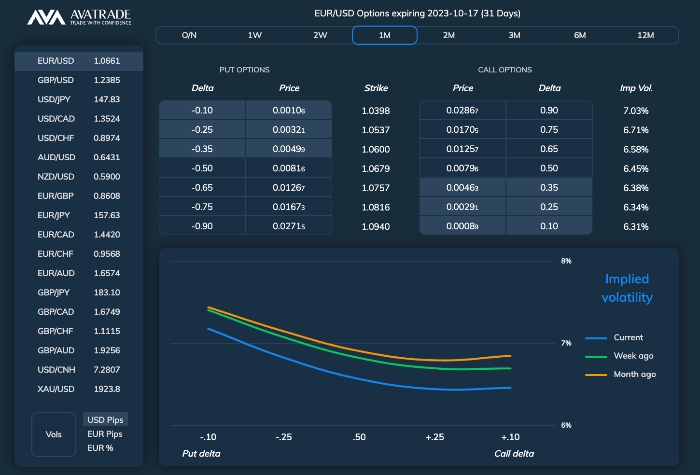Options Trading


Options contracts give you the right to buy or sell an asset during or within a pre-determined date.
This guide to options trading for beginners explains the different types of contracts, plus their pros and cons. We also explain how to start trading options with strategy tips.
Quick Introduction
- Options are derivative instruments that allow traders to buy or sell an asset before, or at, a particular date and at a pre-defined price.
- Traders can use options to speculate on a wide range of assets including shares, currencies, interest rates and bonds.
- Aside from speculation, investors can use options for managing risk and generating income.
- Options traders can use leverage (borrowed money) to amplify their profits.
Best Brokers for Options Trading
These are the top 4 options brokers based on our expert reviews, which consider contract conditions, pricing, trading software and execution:
What Are Options?
An option is a contract that gives individuals the right – but not the obligation – to buy or sell a financial instrument. Options must be exercised within a specific period of time and at a pre-determined price (known as the strike price or exercise price).
There are some similarities between options and futures, another type of derivative instrument. However, a futures contract provides a lot less flexibility. It commits a trader to buying or selling the underlying asset at a certain price and time.
Options contracts also provide an individual with more choice. They can be written on a larger range of underlying assets, including shares, stock market indexes, currencies, bonds and other debt securities, commodities, interest rates, volatility indexes, cryptocurrencies, and exchange-traded funds (ETFs).
What’s more, within each of these categories traders have a wide spectrum of strike prices and expiration dates that they can choose from. Futures, on the other hand, provide a much more limited range of possibilities.

Types Of Options
Options trading contracts fall broadly into two categories: call options and put options:
- The right to buy an underlying asset is known as a call option, and they are bought when an individual expects the price of an asset to rise.
- Conversely, put options give traders the right to sell the asset, and are used when a trader thinks that an asset will fall in value.
These two types of options contracts are known as vanilla options. Their relative simplicity compared with other (known as non-vanilla or exotic) options makes them extremely popular with traders and investors.
Having said that, non-vanilla (or exotic) options can be very useful for experienced investors who want to tailor their risk and reward strategy more carefully.
Such contracts include barrier options, which are exercised only if the value of the underlying asset reaches a pre-established level, and chooser options that allow the holder to decide whether the option will be a call or put later on.
How Options Trading Work
Traders can also choose whether to purchase an European or American options contract. The difference between these types of contracts is not a regional one. Rather, each one offers different timeframes by which the contract must be exercised.
A European option is one that can only be exercised on the stated expiration date.
American options, meanwhile, allow the trader the right to buy or sell the underlying asset at any point before or on the expiration date.
Traders can also select Asian and Bermudan options, though they are much less popular. Asian options provide a payoff based on the average price of an underlying asset over a period, not at a specific time. Bermudan options allow the trader to exercise their right to buy or sell on a series of pre-determined dates.
When it comes to stock options, one contract will usually represent 100 shares of a particular company. This is not always the case, however, and events like stock splits (or reverse splits), mergers, and the issuance of special dividends in the form of shares can impact the contract size.
Options contracts will typically include the following information:
- The underlying asset – shares, bonds, currencies etc
- The type of option – call or put
- The strike price – the pre-agreed price
- The option premium – the price a trader pays to exercise the call or put option
- The contract size – the number of units in the underlying asset that the options contract represents
- The expiration date – when the options contract can no longer be exercised
- The type of option – whether it is European, American, Asian or Bermudan in style
An Example Trade
Trader X has formulated a strategy that involves trading share options, which are the most commonly traded options contracts.
After some careful analysis, Trader X thinks that the share price of Carl’s Cupcake Company – which is currently trading at $50 per share – will rise over the next month. Trader X is therefore looking to buy a call option for the stock.
Having scanned the market, Trader X finds a call option contract with a strike price of $55 and an expiration date of exactly one month’s time. The contract covers 100 shares in the cake maker and has a premium (or price) of $1.50, resulting in a total cost of $150 (100 shares x $1.50).
Let’s fast forward one month to see how Carl’s Cupcake Company is performing. It’s good news: the business is trading above $55 per share, meaning that Trader X’s call option is “in the money.”
In fact, the company is trading at $60 per share, making the call option worth $5 ($60 minus the $55 strike price).
So how much profit has Trader X made on this trade? The first step is to multiply that $5 by the 100 shares that the call option contract covers. This comes to $500.
Now to work out the net profit, we need to subtract that premium of $150. This leaves Trader X with a healthy $350 in their trading account.
What would have happened if Carl’s Cupcake Company had remained below than $55 per share strike price when the contract expired? In this scenario, Trader X’s options contract would be considered “out of the money” and they would have lost the $150 premium they paid to purchase it.
Pros and Cons Of Trading Options
Pros
- Put options are a great way that investors can hedge to reduce the risk in their portfolios and/or make an income.
- Thanks to leverage, options traders can make a significant profit for a fraction of the cost of buying the underlying asset itself.
- Options can remove some risk from trading. Losses are limited to the premium that an individual pays to acquire the options contract. Unlike futures, there is no obligation for them to exercise the option.
- The options market can be highly liquid, making it easy to enter and exit a position.
Cons
- Pre-determined expiration dates mean that a holder will lose money if they fail to exercise an option within a certain period of time.
- Options contracts lose value as the expiration date draws closer, the pace of which accelerates as time goes by. This can result in a trader nursing uncomfortable losses.
- While leverage can help options holders turbocharge their profits, it can also cause them to lose a lot of money in a short space of time.
- Options can be difficult to understand, particularly non-vanilla contracts. This can deter many retail investors from getting involved, and can also lead to a trader making the wrong investing decision and racking up large losses.
How To Trade Options
The first step is to choose a brokerage to do business through.
The costs of trading can vary enormously between options brokers, and it’s important to check that there are no hidden fees involved. Some firms, such as SoFi Invest, even offer zero commissions on options trades.
Choosing the trading platform that best suits you is another key consideration. Use a firm that offers sophisticated software and features (like charts, filters and pattern recognition) and an easy-to-follow interface that allows for trades to be made quickly and simply. AvaTrade is a good option here, with its AvaOptions platform outperforming most rivals.

As well as offering cash accounts, certain brokerages also allow traders to open margin accounts. This allows individuals to borrow funds to buy options contracts, thus allowing them to build larger positions than they often would by using just their own money. It is important to remember though that trading on margin can magnify profits and losses.
Buying call and put options are the simplest strategy that traders in these derivatives use. However, there are also more refined strategies that can be used to make money.
For example, covered call writing on share options can involve someone owning shares in a company and then selling call options on them. By doing this, a person can make an income by collecting the premiums if the stock price hasn’t risen when the contract expires.
A protective put strategy, meanwhile, is where someone who holds shares in a business purchases put options so as to limit any potential downside if the price of the stock drops.
Tips For A Successful Options Trading Strategy
1. Get Informed
Options contracts come with varying layers of complexity, but even vanilla traders need to have a strong knowledge of how they work.
For example, getting to know ‘The Greeks’ – those factors that combine to influence options prices – are a complicated yet fundamental part of options trading that even beginners must master (these are Delta (Δ), Theta (Θ), Gamma (Γ), Vega (ν), and Rho (ρ)).
Reading books, chatting on market blogs, and even taking online courses are useful for people starting out with these derivatives. Traders must also keep a close eye on financial news, and to keep abreast with macroeconomic and geopolitical developments that could affect market movements.
2. Tool Up
Brokers have invested lots of money to attract customers with the best trading platforms. But there is also a lot of great third-party software out with excellent functionality and attractive customization options.
The fast-paced nature of day trading means that automated bots can also be highly valuable devices for options traders to use. These scan the market and swiftly execute buy or sell orders without the need for human interference.
3. Use Time Wisely
Like any form of trading, it is important not to rush in when you might see an opportunity to make a profit. Be patient and take time to consider all the angles, especially when starting out. Remember that the aim is to build wealth over a long period.
On a related note, getting up bright and early can give options traders a big advantage. Having a feel for where markets may be heading a couple of hours before they open can help you formulate a winning options trading strategy.
Bottom Line
Options contracts can be great for active traders who like a degree of flexibility. In addition, they can be used effectively as part of a speculation strategy, for risk management, and to build income.
However, as with the exchange of any financial instrument, options traders can leave themselves open to losing capital, so plenty of research and a disciplined approach is essential.
FAQ
What Is An Options Contract?
Options contracts are financial instruments that can be used to buy a wide range of assets. Their value is derived from the price of the underlying asset, and they give the holder the right (but critically not the obligation) to buy said asset within a specified timeframe.
Why Do Traders Use Options?
Options contracts are used by individuals and organizations for a variety of reasons. Day traders, for example, use them to speculate on the price movements of underlying assets. If they are bullish (or positive) on, say, a company’s stock price they will buy a call option. If all goes well and the share value increases, the holder can make a profit by buying at the lower strike price and selling at the higher market price.
Options trading can be a much more cost-effective way for speculators to try and profit from financial market movements. The use of leverage allows them to create a position at a much lower cost than by investing directly in the underlying asset.
Traders and investors also use options contracts to reduce risk and volatility in their portfolios through hedging. For example, if someone owns shares in a particular company and is worried about a possible price fall, they can buy put options to taper potential losses.
What Does It Mean To Exercise An Option?
This involves carrying out the contract by buying or selling the underlying asset within a specified time and at a particular price. Holders can allow options to expire, or they can sell them in the market before expiration to close their position.
Is Options Trading Popular?
Lower commissions, increased investor awareness, and the use of increasingly nuanced trading strategies mean options contracts have become very fashionable. JP Morgan estimates that $1 trillion worth of ‘zero days to expiration’ options – those contracts that expire on the same day that they are bought – are traded daily.
How Is Options Trading Taxed?
The tax treatment of such derivatives depends on several factors including the type of options contract, how long they are held for, and the holder’s tax status. Capital gains tax is usually applicable, while income tax may also be applied.
Consult a local tax expert for information tailored to your circumstances.
Recommended Reading
Article Sources
- Option Trading: Pricing and Volatility Strategies and Techniques, Euan Sinclair
- Options Trading For Dummies, Joe Duarte
- Options Trading 101: From Theory to Application, Bill Johnson
- An Introduction to Options Trading, Frans de Weert
- AvaTrade - AvaOptions Trading Platform
The writing and editorial team at DayTrading.com use credible sources to support their work. These include government agencies, white papers, research institutes, and engagement with industry professionals. Content is written free from bias and is fact-checked where appropriate. Learn more about why you can trust DayTrading.com



